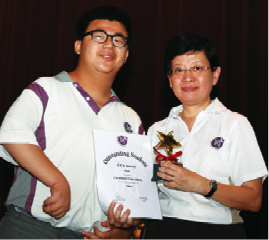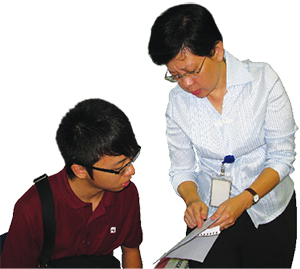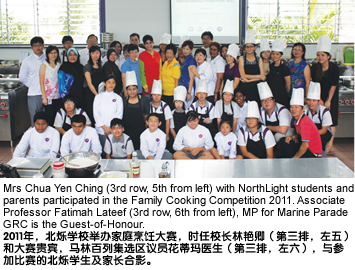
Just because a child did not start well, it does not mean that he cannot end well,” Mrs Chua Yen Ching, Director for Curriculum Planning and Development at the Ministry of Education (MOE), expressed and emphasised this belief in an email interview with the bilingual, bi-monthly educational magazine EduNation.
“Students have uneven strengths. Though they may not have done well academically they do have talents in other areas like sports and the arts. Every student has opportunities to experience a range of programmes and the teachers will help students to identify their interests and strengths. Every student is valued for who he is and the teachers will help him to redefine success and see failure differently. When he experiences failure, he can either give up or learn from his mistakes and persevere. If he goes for the latter, he will experience a breakthrough and not a breakdown,” she said.
Mrs Chua was NorthLight School’s (NLS) first principal. The School was established in 2007 and was the first school established in Singapore to specifically take in students who have failed their Primary School Leaving Examination (PSLE). Mrs Chua, together with her team of teachers, as well as staff from MOE and the Institute of Technical Education (ITE), developed a curriculum that provides students with a strong foundation in character education, firm academic fundamentals, and a taste of vocational education. The nurturing and inviting learning environment has helped students regain their self-confidence and made them determined to make a difference to their families and society.
Design of the Curriculum Must Give Students a Sense of Achievement
 Mrs Chua pointed out that all students learn differently. If teachers are able to match their teaching methods with the learning styles of their students and help them see meaning in their learning, the students’ interest in their studies will be sustained. Teachers from NLS and Assumption Pathway School (APS) know their students well and they have developed a number of innovative pedagogies that resonate with their students who are mainly kinaesthetic and visual learners. Besides the cognitive aspect, the schools also conduct programmes that enhance the students’ social emotional learning. Mrs Chua pointed out that all students learn differently. If teachers are able to match their teaching methods with the learning styles of their students and help them see meaning in their learning, the students’ interest in their studies will be sustained. Teachers from NLS and Assumption Pathway School (APS) know their students well and they have developed a number of innovative pedagogies that resonate with their students who are mainly kinaesthetic and visual learners. Besides the cognitive aspect, the schools also conduct programmes that enhance the students’ social emotional learning.
During its conceptualisation stage in 2006, Mrs Chua and her team referred to a variety of literature and research as they developed NLS’ curriculum framework. Once finalised, it had three main features: character education, basic academic skills formation, and vocational training. The first of these strengthens the students’ self-awareness and social emotional competencies. This is because they need to know how to manage their emotions, make informed decisions, and be responsible for the decisions they make. There is also a set of core values which provides the students with a moral compass. The second feature instils the literacy, numeracy and information-communication skills that are necessary to successfully engage with the vocational modules. The third, vocational education, will make the students employable, and prepare them for work after graduation.
“It was the first time such a curriculum had been developed for this group of students and the teachers were very aware that they needed to be dynamic and prepared to fine-tune and make adjustments along the way. Many opportunities were provided to allow the students to experience small successes that boosted their confidence level for further learning,” said Mrs Chua.
Parents and Community as Supportive Partners
NLS has become a beacon of hope for the many parents of children whose futures once seemed bleak. In 2008, a number of these parents wrote their stories down, as a way of commending the teachers for their patience in helping to turn their children’s lives around. These have subsequently been consolidated into a book titled Heartwork@NorthLight, and presented to the School as a gift on Teachers’ Day. Mrs Chua said that it was a touching moment for all the staff.
 When other stakeholders saw how the children had turned around, they could identify with NLS’ mission and many became partners of the School. When other stakeholders saw how the children had turned around, they could identify with NLS’ mission and many became partners of the School.
One of these was a baker who used to deliver his first batch of buns every day to the students who did not have any money for breakfast. Another was a doctor who provided free medical consultations for NLS students, and then there was a group of 40 cab drivers who volunteered to take the children who were unwell home for free. Many companies also came forward to offer attachments so that the students could apply what they had learnt in school to a real workplace. One student from NLS’ first batch completed his NITEC course with ITE, went on to do National Service and then found a job at the company, Home-Fix — the same company where he had done his industrial attachment when he was in his final year in NLS. He told Mrs Chua that to many Home-Fix might be just a DIY hardware company but to him Home-Fix is like a family.
Assets to Society
Most of the students from the first two cohorts from APS and NLS have completed their ITE Skills Certificate, and subsequently their NITEC course with ITE. A few of them are currently pursuing their diplomas in the polytechnics, something which they might not have expected when they failed their PSLE. The rest have found employment and are contributing to their families and society.
“It is heartening to see how education has been a social leveller for many of these students and that many of them are seeing their aspirations become a reality,” Mrs Chua said.
Translated by: Kwan Cheurn Hsi
|